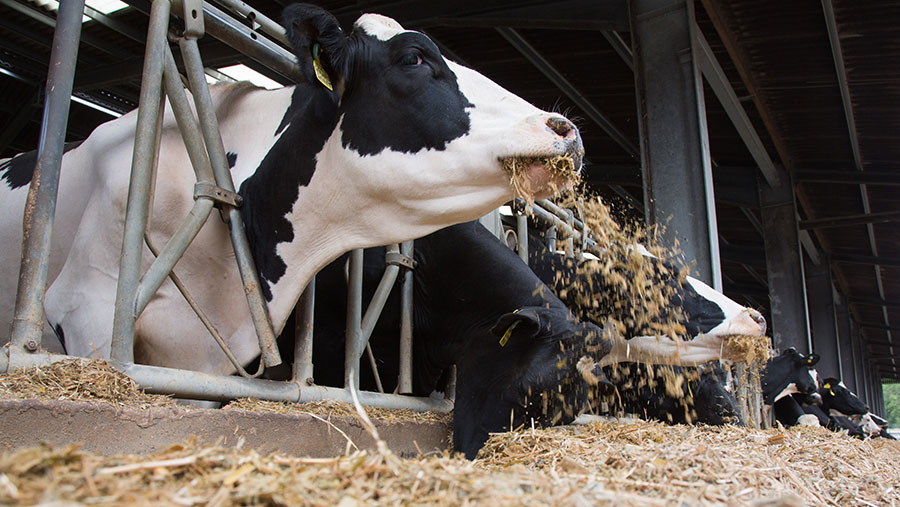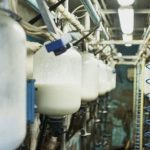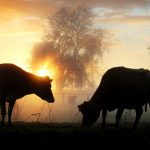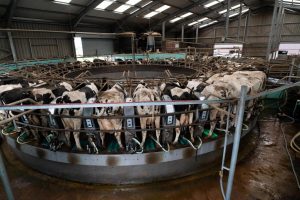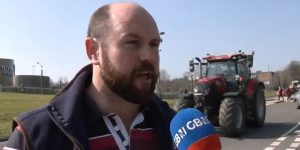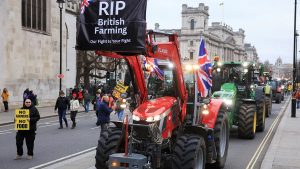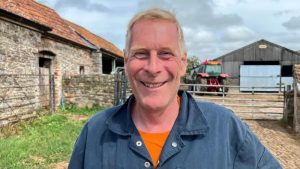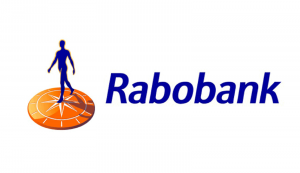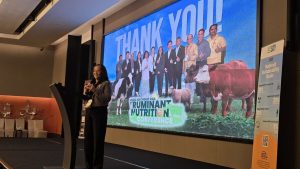
Brexit uncertainty is not the only thing on Mike Martin’s mind. Heavy rains have combined with pesticide restrictions to delay wheat planting on his farm in the south of England; an army of weevils is drilling holes in his beans; recently he caught some thieves trying to steal his tools.
He also worries about a growing “anti-farmer brigade” of animal welfare and climate change activists who blame “bovines for all the greenhouse gases”.
“Every dairy farm has been put on their website. You don’t know who is going to turn up,” he said.
British farmers such as Mr Martin feel they are being squeezed on all sides: by environmental protesters picketing meat markets; Conservative policies outlined in this month’s Queen’s Speech parliamentary legislation prioritising environment and animal welfare; and post-Brexit trade arrangements that they say threaten their livelihoods.
The combination has left these largely Tory voters questioning whether politicians in Westminster are conscious of how precarious farming in Britain could become.
Among a range of farmers interviewed in Sussex, those who voted to leave the EU in 2016 — like the majority of their peers nationwide — said they did so on the assumption that their interests would be protected in future trading relations.
But a number of proposed government policies, including fresh restrictions on livestock transport, and a pre-Brexit drop in the price of beef added to Mr Martin’s conviction that Boris Johnson’s government is trying to square circles in ways that come at his, and other farmers’ expense.
Earlier this month the government released a new tariff schedule in preparation for the possibility of the UK leaving Europe without a deal on October 31. It proposed dropping import tariffs, which could ease food price rises in the event that barriers with Europe are suddenly erected. But it would also open up the UK to cheap imported food that would be illegal to produce here because it fails to meet environmental and animal welfare standards.
That prospect has receded as the EU considers a request for a further delay in the UK’s departure date. But should Britain eventually leave without a deal, as some ardent Brexiters prefer, pressure on prices would jeopardise many rural livelihoods, said Minette Batters, the president of the National Farmers’ Union.
“Farmers are going to feel betrayed,” she said. “I don’t recall anyone selling a vision of post-Brexit Britain as one involving lower standard food filling shop shelves while British farmers . . . go out of business.”
In any Brexit scenario, farm incomes will drop to varying degrees, with sheep farmers hardest hit, according to modelling by the Agricultural and Horticultural Development Board, a farmer funded national body.
Should the government fail to reach agreement on future trading relations, drive Britain out of the EU on WTO terms, and then phase out farm subsidies as planned, half of all UK farms would cease to be financially viable, according to Sean Rickard, former economist at the NFU.
That possibility is giving some traditional Conservative farmers pause for thought.
“From a personal point of view I can’t imagine ever voting Tory again,” said Ben Taylor, who manages 1,700 acres of land on the rolling hills of Sussex’s South Downs, which has been farmed since neolithic times.
The air around him was filled with endangered skylarks, a testament to his efforts planting meadows and flower strips to ensure wild birds as well as cattle and cereal crops can thrive. The farm has diversified too, with holiday cottages and fishing lakes to supplement traditional income.
Mr Taylor points tothis year’s rapeseed crop as an example of the damage done by what he says are Britain’s double standards that allow the country’s environmental footprint to be offshored to countries with a more laissez-faire attitude to the way food is produced.
A new EU ban on neonicotinoid pesticides, which endanger bees, caused him and other farmers in the area to lose a third of their rapeseed crop. The UK made up for the shortfall by importing rapeseed oil from countries such as Canada where neonicotinoids are still in use, depressing the UK price in the process.
“We can’t produce cheaper. But we can import it from places that use methods we are not allowed to use,” he said. “The consequence is that large tracts of land will be abandoned,” he added, emphasising that best practice costs money: “You can’t be in the red if you want to be green.”
Some Sussex farmers havebeen preparing for the day when Brexit, the loss of subsidies and tightening restrictions pile pressure on their competitiveness.
“Our aim is to be in the 5 to 10 per cent of lowest cost producers,” said James Wallis, who farms the 2,000 acre Sutton Hall estate on contract, mostly for dairy cows.
The farm has invested £1.2m in a new dairy unit that borrows cost efficient methods developed in New Zealand. In the year since it started production it has yielded returns of 15 per cent.
John Sclater, former chairman of Equitable Life and an ardent Brexiter whose family owns the estate, has also taken a long-term view of environmental sustainability. Since the 1970s, he has planted 250,000 oak trees. More recently he has started planting Christmas trees and willow trees for cricket bats.
“Let’s work on the assumption that subsidies go down to zero. It’s interesting when you pose a question like that in good time,” he said. “Great changes create damage and opportunity,” he added. “We will see who survives.”
But that Darwinian future, embraced by free market ideologues among Conservative supporters, is less popular among farmers with fewer resources at their disposal.
“If you take away subsidies and on top of that let in all the cheap shit, we’re doomed,” said Mr Taylor. “I haven’t sharpened up my pitchfork yet, but I have a whetstone ready.”
